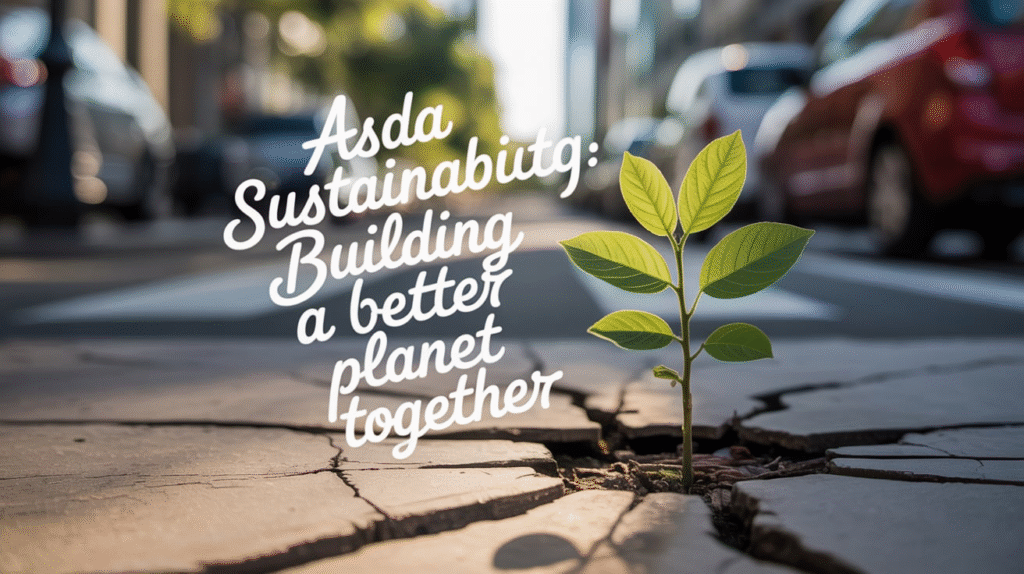ASDA’s sustainability mission goes far beyond reducing waste — it’s about rethinking the entire retail experience to protect the planet for future generations. Through innovative packaging, eco-friendly stores, and responsible sourcing, ASDA continues to show that affordable shopping and environmental care can go hand in hand.

ASDA’s “Better Planet” Strategy
ASDA’s sustainability framework, known as the Better Planet strategy, focuses on four key goals: reducing waste, cutting carbon emissions, supporting sustainable products, and helping customers make greener choices. The retailer’s long-term ambition is to become a Net Zero carbon business by 2040 — a commitment that puts environmental responsibility at the core of its operations.
Reducing Plastic and Packaging Waste
One of ASDA’s most visible achievements is its effort to eliminate unnecessary packaging. The supermarket has removed thousands of tonnes of plastic from shelves by introducing lightweight, recyclable, and compostable alternatives. Through its Refill Zones — available in selected stores — customers can refill containers with essentials like pasta, rice, and cleaning products, helping to reduce single-use packaging.
Recycling Initiatives Across ASDA Stores
ASDA makes recycling easy for customers through in-store recycling points. These facilities accept soft plastics, batteries, and even clothing through ASDA’s partnership with clothing reuse charities. All own-brand plastic packaging is now recyclable where facilities exist, and ASDA continues to invest in new packaging technologies to make recycling simpler and more accessible nationwide.
Tackling Food Waste
Reducing food waste is another major part of ASDA’s sustainability goals. The retailer redistributes surplus food from stores and depots through partnerships with FareShare and The Trussell Trust. This initiative has helped donate millions of meals to UK communities while reducing landfill waste. Additionally, ASDA’s “Wonky Veg” range helps reduce waste by selling imperfect but perfectly edible produce at a lower price.
Carbon Reduction and Renewable Energy
ASDA is steadily reducing its carbon footprint across stores, distribution, and logistics. The retailer has upgraded refrigeration systems, introduced electric and hybrid delivery vehicles, and invested in renewable energy. Solar panels now power many distribution centres, while LED lighting and smart building systems help reduce energy consumption in stores. The company’s goal to be carbon neutral by 2040 is supported by annual carbon reduction targets.
Eco-Friendly Delivery and Logistics
ASDA’s home delivery service has also embraced sustainability through “green slots” — delivery times that optimise van routes to reduce emissions. The company has invested in electric delivery vans and lightweight crates to cut fuel usage. Its centralised distribution network ensures products travel fewer miles, lowering the overall carbon impact of grocery deliveries.
Supporting Sustainable Sourcing
ASDA’s mission and values prioritise ethical sourcing and fair labour practices. The company works closely with global and British suppliers to ensure that products are responsibly produced and fairly traded. Many of its coffee, tea, and chocolate products carry the Fairtrade or Rainforest Alliance certification, ensuring fair wages and environmentally conscious farming.
Encouraging Customers to Live Greener
ASDA empowers customers to make sustainable choices through clear labelling and education. Its “Greener at ASDA Price” campaign highlights eco-friendly products that don’t cost more. This initiative proves that sustainability doesn’t have to be expensive — it can be practical, affordable, and accessible for everyone. Customers can also explore ASDA’s vegan and plant-based range to further reduce their environmental impact.
Partnerships for a Greener Future
ASDA collaborates with organisations, charities, and government bodies to drive nationwide sustainability progress. Partnerships with WRAP (Waste & Resources Action Programme) and the Ellen MacArthur Foundation support ASDA’s journey towards a circular economy. The company also participates in industry-wide plastic reduction commitments under the UK Plastics Pact.
Community and Environmental Projects
Through the ASDA Foundation, the company funds local environmental projects such as community gardens, green spaces, and waste reduction education in schools. These projects encourage local engagement while promoting eco-friendly habits that benefit both people and the planet.
ASDA’s Approach to Climate Risk and Transparency
Transparency is key to ASDA’s sustainability efforts. The company publishes regular Sustainability and ESG reports outlining progress against carbon, waste, and ethical sourcing targets. ASDA is also developing climate risk assessments in line with the Task Force on Climate-related Financial Disclosures (TCFD), demonstrating accountability to investors and customers alike.
Green Innovation in ASDA Stores
New ASDA stores and refurbishments incorporate eco-friendly technology from the ground up. Features such as energy-efficient refrigeration, rainwater harvesting, and EV charging bays are becoming standard across new sites. The company’s ASDA Express stores also utilise compact, low-energy designs that minimise environmental impact while maximising convenience.
Looking Ahead: ASDA’s Sustainability Goals
ASDA’s long-term environmental goals include achieving 100% recyclable packaging by 2025, Net Zero operational carbon by 2040, and zero food waste to landfill. Future projects will focus on greener transport, digital supply chain efficiency, and greater product traceability to ensure sustainability across every stage of retail.
Conclusion
ASDA’s sustainability vision blends environmental responsibility with customer value. From reducing plastic and food waste to promoting plant-based diets and ethical sourcing, the company continues to lead by example. Its ambitious Net Zero goals and commitment to innovation ensure that sustainability remains at the heart of ASDA’s business — helping customers shop smarter, live greener, and build a better planet together.
SEO Summary: This article builds ASDA’s sustainability topical authority by interlinking with mission, delivery, vegan range, and community pages. It’s optimised for search terms such as “ASDA sustainability,” “ASDA environmental policy,” “ASDA Net Zero,” and “ASDA recycling,” enhancing both relevance and interlinking strength on GroceryBrands.net.
